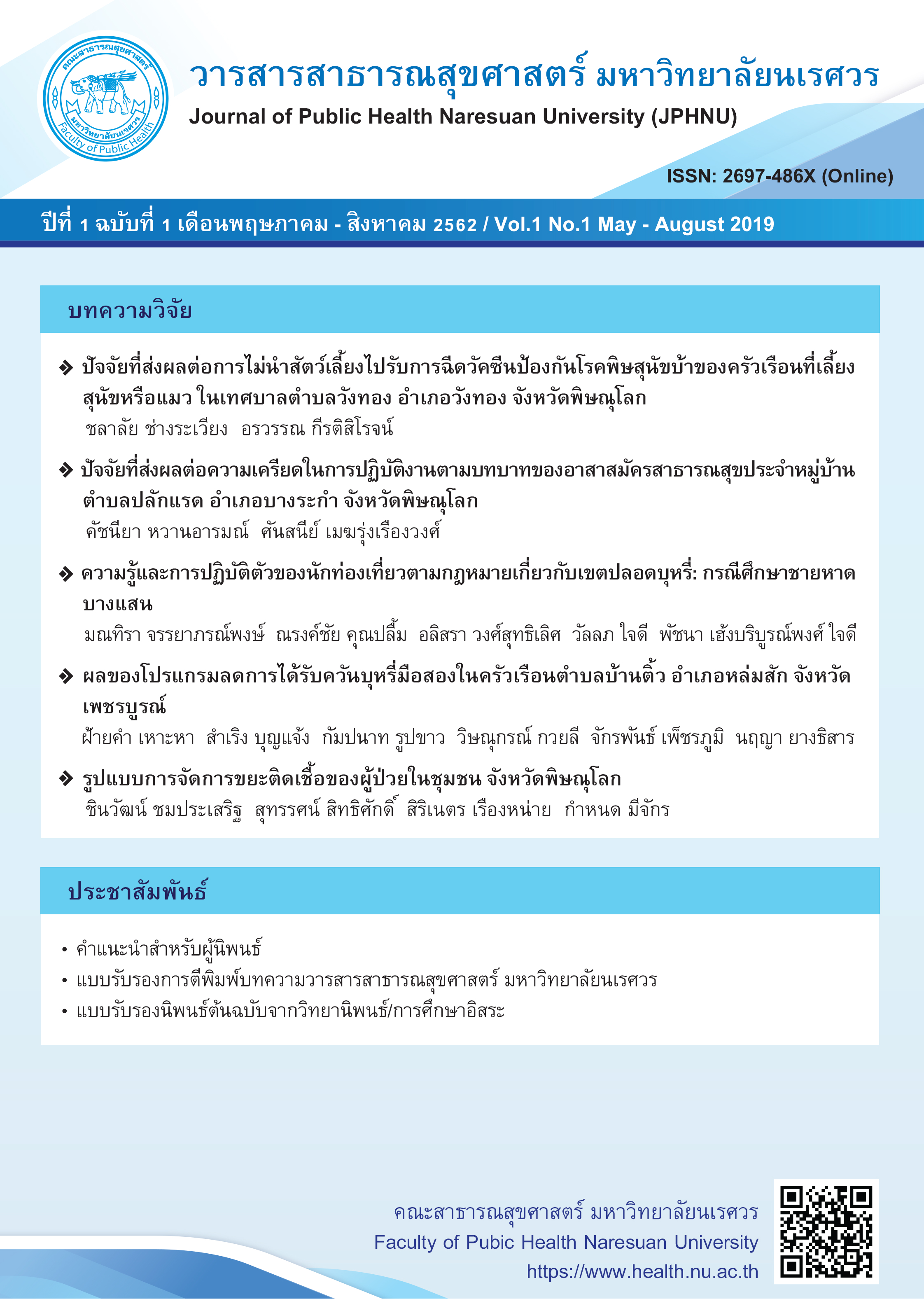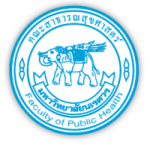The Model of an Infectious Waste management of Patients in the communities at Phitsanulok Province
Keywords:
Infectious waste management, Infectious waste in the community, Patients in the communitiesAbstract
This research and development design aimed to develop the model for managing infectious waste in the community at Phitsanulok province. Data was collected both quantitative and qualitative methods implemented in 3 phases. Phase 1 composed of assessment of the perception regarding infectious waste separation, infectious waste collecting, infectious waste transferring, and infectious waste disposal. The obtained 385 participants, patients or relatives in the community, were recruited using multi-stage random samplings. Phase 1 data obtained by using questionnaires. Phase 2 composed of development of infectious waste management model that conducted with the stakeholder who involves in managing infectious waste. Purposive samplings employed to select 15 participants. Phase 2 data obtained by using focused group discussion. Phase 3 compose of implementation of the model in community that was carried out in the sample of patients or relatives. Simple random sampling employed with 30 study samples. Phase 3 data obtained by using questionnaires. Descriptive statistics and inferential statistics of paired t-test used for analyzing quantitative data and content analysis used for
analyzing qualitative data.The results showed that 46.8% of the sample had eliminated of household infectious waste by burning and burying themselves, 7.5% of the sample had dumped with general waste 7.5%, and 83.4% have been received knowledge of infectious waste. After implemented the model in managing infectious waste in the community, it found that the sample had significantly higher mean score of perceived infectious waste management than before participating of infectious waste management model
(t = 12.64, p-value < 0.001).
References
Manee-in, J. (2013). Infectious Waste Management of Local Authorities. Master's thesis,Bangkok: Graduate School National Instituteof Development Administration. (in Thai)
Niyompanitpatana, T., Elivio, B. (2012). A Design Study of Sustainable Infectious Waste Management Systems for Small Healthcare Providers in North-Eastern Thailand.OIDA International Journal of Sustainable Development, 4(4), 65-76.
O-iam, P. (2013). The Infectious Waste Management Behavior of The Samutsakorn hospital staff and personnel. Academic Services Journal,24(4), 126-124. (in Thai)
Phitsanulok Provincial Public Health Office. (2017).Annual Report 2017. Phitsanulok Provincial Public Health Office, Phitsanulok. (in Thai)
Pollution Control Department. (2017). Action plan"Thailand without garbage" according to the guidelines "Pracha Rat" (2016-2017).Pollution Control Department, Ministry of Natural Resources and Environment, Bangkok.(in Thai)
Pollution Control Department. (2018). Master Plan for Municipal Waste Management(2016-2021). Bangkok: Active Print Co., Ltd.(in Thai)
Regional Health Promotion Center 2. (2018).Annual Report 2018. Environmental Health.Development group, Regional HealthPromotion Center 2. Phitsanulok. (in Thai)
Vikaipat, P. (2007). Household infectious waste management in Chiangkian community,Chiangmai Province. Academic conference 45th Kasetsart University, Academic discipline of Architecture, Engineering,Natural Resources and Environment.Bangkok: Kasetsart University. (in Thai)
World Health Organization. (2014). Safe management of wastes from health-care activities. 2nd edition. Switzerland, Geneva.
Yodnin, A. (2010). Infectious Waste Management in Thailand. (Doctor of Philosophy Major Public Administration Graduate School,Ramkhamhaeng University. (in Thai)
Kaweekorn, P., Kulvisate, N., Hemala, A. (2017).Model Development of waste management in Yasothon Province. Community Health Development Quarterly Khon Kaen University,5(4), 703-728. (in Thai)
Manee-in, J. (2013). Infectious Waste Management of Local Authorities. Master's thesis,Bangkok: Graduate School National Instituteof Development Administration. (in Thai)
Niyompanitpatana, T., Elivio, B. (2012). A Design Study of Sustainable Infectious Waste Management Systems for Small Healthcare Providers in North-Eastern Thailand.OIDA International Journal of Sustainable Development, 4(4), 65-76.
O-iam, P. (2013). The Infectious Waste Management Behavior of The Samutsakorn hospital staff and personnel. Academic Services Journal,24(4), 126-124. (in Thai)
Phitsanulok Provincial Public Health Office. (2017).Annual Report 2017. Phitsanulok Provincial Public Health Office, Phitsanulok. (in Thai)
Pollution Control Department. (2017). Action plan"Thailand without garbage" according to the guidelines "Pracha Rat" (2016-2017).Pollution Control Department, Ministry of Natural Resources and Environment, Bangkok.(in Thai)
Pollution Control Department. (2018). Master Plan for Municipal Waste Management(2016-2021). Bangkok: Active Print Co., Ltd.(in Thai)
Regional Health Promotion Center 2. (2018).Annual Report 2018. Environmental Health.Development group, Regional HealthPromotion Center 2. Phitsanulok. (in Thai)
Vikaipat, P. (2007). Household infectious waste management in Chiangkian community,Chiangmai Province. Academic conference 45th Kasetsart University, Academic discipline of Architecture, Engineering,Natural Resources and Environment.Bangkok: Kasetsart University. (in Thai)
World Health Organization. (2014). Safe management of wastes from health-care activities. 2nd edition. Switzerland, Geneva.
Yodnin, A. (2010). Infectious Waste Management in Thailand. (Doctor of Philosophy Major Public Administration Graduate School,Ramkhamhaeng University. (in Thai)
Kaweekorn, P., Kulvisate, N., Hemala, A. (2017).Model Development of waste management in Yasothon Province. Community Health Development Quarterly Khon Kaen University,5(4), 703-728. (in Thai)
Manee-in, J. (2013). Infectious Waste Management of Local Authorities. Master's thesis,Bangkok: Graduate School National Instituteof Development Administration. (in Thai)
Niyompanitpatana, T., Elivio, B. (2012). A Design Study of Sustainable Infectious Waste Management Systems for Small Healthcare Providers in North-Eastern Thailand.OIDA International Journal of Sustainable Development, 4(4), 65-76.
O-iam, P. (2013). The Infectious Waste Management Behavior of The Samutsakorn hospital staff and personnel. Academic Services Journal,24(4), 126-124. (in Thai)
Phitsanulok Provincial Public Health Office. (2017).Annual Report 2017. Phitsanulok Provincial Public Health Office, Phitsanulok. (in Thai)
Pollution Control Department. (2017). Action plan"Thailand without garbage" according to the guidelines "Pracha Rat" (2016-2017).Pollution Control Department, Ministry of Natural Resources and Environment, Bangkok.(in Thai)
Pollution Control Department. (2018). Master Plan for Municipal Waste Management(2016-2021). Bangkok: Active Print Co., Ltd.(in Thai)
Regional Health Promotion Center 2. (2018).Annual Report 2018. Environmental Health.Development group, Regional HealthPromotion Center 2. Phitsanulok. (in Thai)
Vikaipat, P. (2007). Household infectious waste management in Chiangkian community,Chiangmai Province. Academic conference 45th Kasetsart University, Academic discipline of Architecture, Engineering,Natural Resources and Environment.Bangkok: Kasetsart University. (in Thai)
World Health Organization. (2014). Safe management of wastes from health-care activities. 2nd edition. Switzerland, Geneva.
Yodnin, A. (2010). Infectious Waste Management in Thailand. (Doctor of Philosophy Major Public Administration Graduate School,Ramkhamhaeng University. (in Thai)
Downloads
Published
How to Cite
Issue
Section
License
The published article is copyrighted by the Journal of Public Health and Health Sciences Research.
The statements that appear in each article in this academic and research journal are the personal opinions of each author and are not related to Naresuan University and other faculty members in the university. Responsibilities regarding each article are the responsibility of each author.






